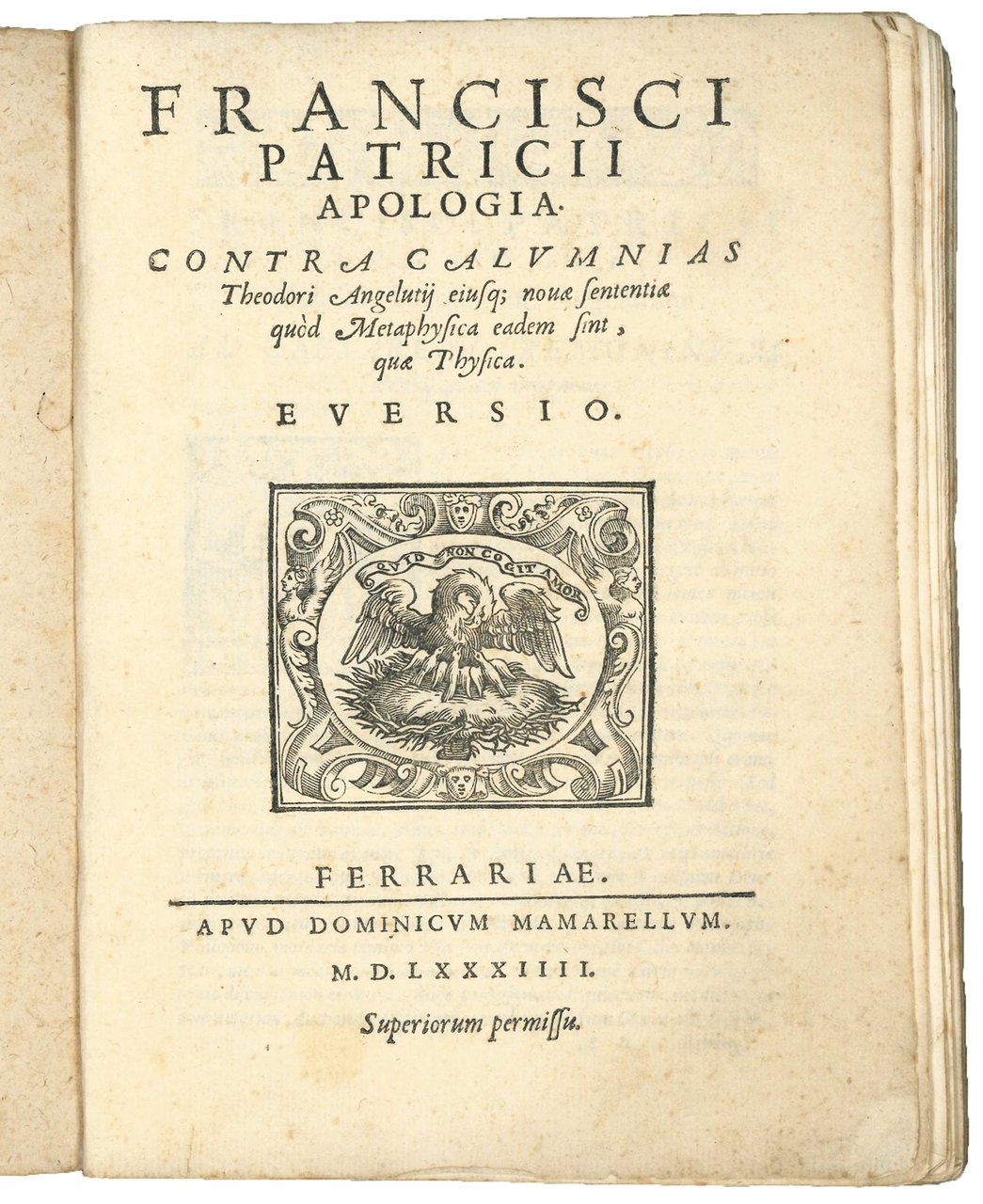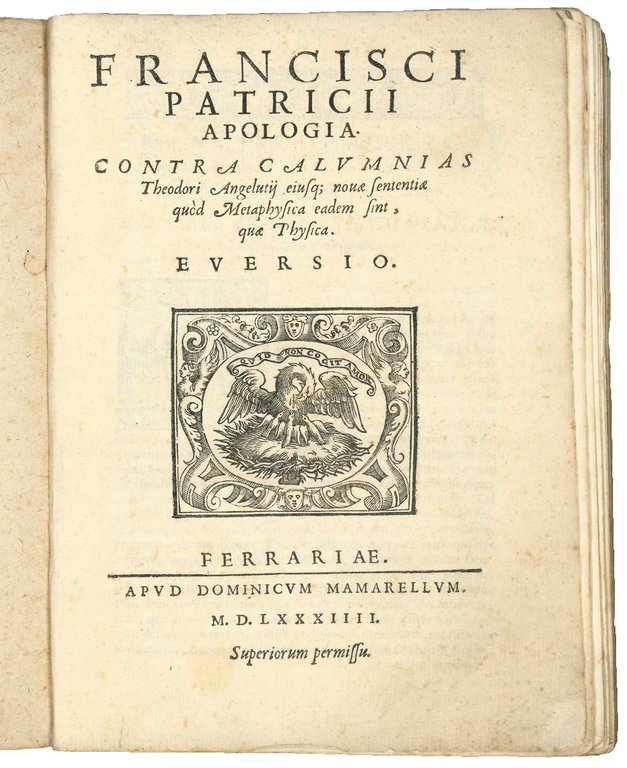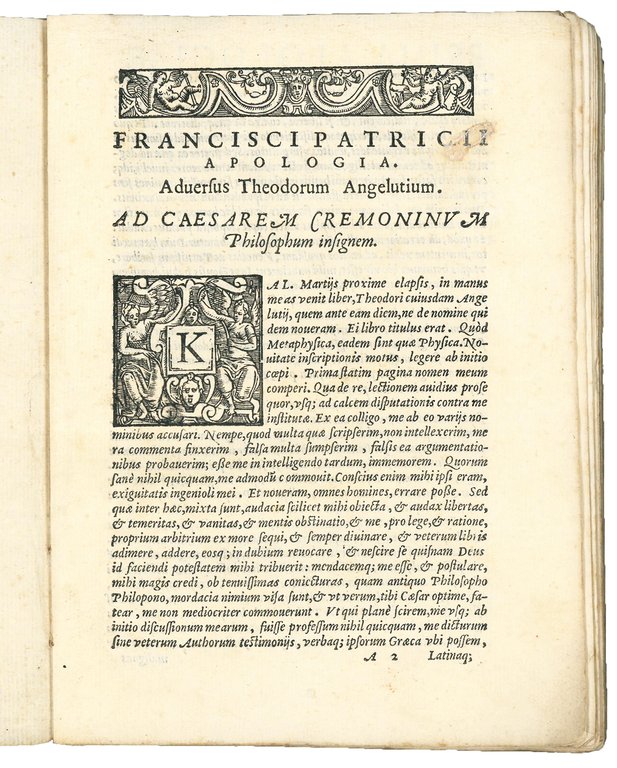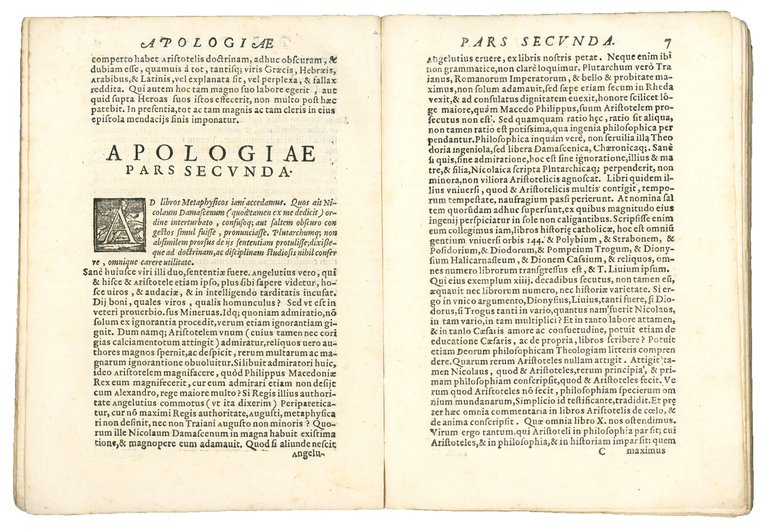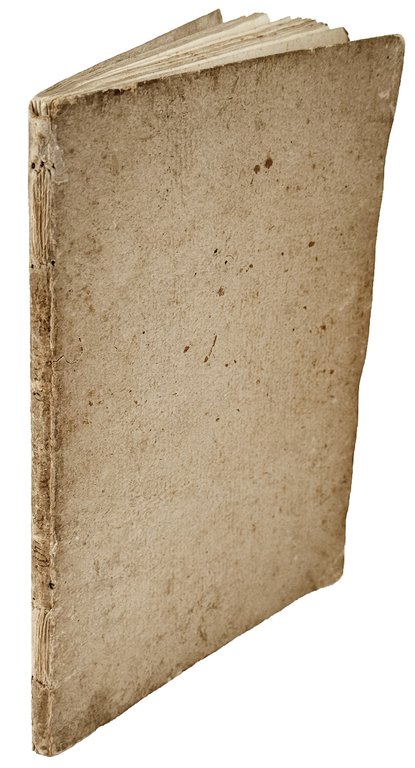Francisci Patricii Apologia. Contra calumnias Theodori Angelutij eiusque novae sententiae quod metaphysica eadem sint, quae physica. Eversio
Francisci Patricii Apologia. Contra calumnias Theodori Angelutij eiusque novae sententiae quod metaphysica eadem sint, quae physica. Eversio | Libri antichi e moderni | PATRIZI, Francesco (1529-1597)
Francisci Patricii Apologia. Contra calumnias Theodori Angelutij eiusque novae sententiae quod metaphysica eadem sint, quae physica. Eversio
Francisci Patricii Apologia. Contra calumnias Theodori Angelutij eiusque novae sententiae quod metaphysica eadem sint, quae physica. Eversio | Libri antichi e moderni | PATRIZI, Francesco (1529-1597)
Metodi di Pagamento
- PayPal
- Carta di Credito
- Bonifico Bancario
- Pubblica amministrazione
- Carta del Docente
Dettagli
- Anno di pubblicazione
- 1584
- Luogo di stampa
- Ferrara
- Autore
- PATRIZI, Francesco (1529-1597)
- Editori
- Domenico Mammarello
- Soggetto
- Quattro-Cinquecento
- Stato di conservazione
- Buono
- Lingue
- Italiano
- Legatura
- Rilegato
- Condizioni
- Usato
Descrizione
APPARENTLY NO COPIES IN US LIBRARIES
4to (203x147 mm). [2], 40 [i.e. 38] leaves. Leaves 15-16 are omitted in numbering. Collation: A-K4. The final quire is present twice. Printer's device on the title page. Woodcut decorated initials. Contemporary or slightly later cardboards “alla rustica” (soiled and worn). Small hole to the upper margin of l. D1 affecting one letter of the current title, some occasional light browning, title page slightly soiled, a very good copy.
Extremely rare first edition, dedicated by Patrizi to Cesare Cremonini (1557-1631), professor of natural philosophy at the universities of Ferrara and Padua. In 1584, Teodoro Angelucci (d. ca. 1600) attacked Patrizi's interpretation of Aristotelian metaphysics in his Quod metaphysica sint eadem, quae physica, nova Theodori Angelutii sententia (Venice, 1584). Patrizi replied with the Apologia contra calumnias Angelutti, to which his opponent responded with the Exercitationum Theodori Angelutii cum Francisco Patritio. Liber primus. In quo de metaphycorum authore, appellatione, & dispositione disputatur. Et quod metaphysica sint eadem quae physica iterum asseritur (Venice, 1585), criticising him for favouring the enigmatic Pythagoras, Zoroaster and Hermes Trismegistus over the enlightened Aristotle. A reflection of this dispute can be found in the Disceptationum libri V contra calumnias Angelutii by Francesco Muti (Ferrara, 1588), a follower of Telesio, whose theses are so close to those of Patrizi that Pierre Bayle attributed the writing to the latter (cf. M. Palumbo, Patrizi, Francesco, in: “Dizionario Biografico degli Italiani”, 81, Rome, 2014, s.v.).
Patrizi's rigorous philological critique of Aristotle's works aims to demonstrate the existence of earlier theological speculation on the same subject, rooted in the distant past. According to Patrizi, Aristotle's entire theology is based on earlier speculations about God, mainly developed by ancient theologians such as the Chaldeans, Egyptians, Jews and Greeks, as well as the Eleatics and Plato. In his apology, Patrizi defends freedom of thought against supporters of Aristotle's authority. Here, in a more concise and discursive form, he revisits many of the arguments he used in the second volume of his Discussiones, in which he developed the theme of Aristotle's debts to his predecessors in various philosophical disciplines (M. Muccillo, Un dibattito sui libri metafisici di Aristotele fra platonici, aristotelici e telesiani (con qualche complicazione ermetica): Patrizi, Angelucci e Muti sul soggetto della metafisica, in: “Medioevo”, XXXIV, 2009, pp. 221-304).
Born in Cherso (today Cres), Istria, “Francesco Patrizi studied at Ingolstadt, at the University of Padua (1547-1554), and at Venice. While in the service of various noblemen in Rome and Venice he made several trips to the East, where he perfected his knowledge of Greek, and to Spain. He lived for a time at Modena and at Ferrara, before being appointed to a personal chair of Platonic philosophy at the University of Ferrara by Duke Alfonso Il d'Este in 1578. He remained there until 1592, when Pope Clement VIII summoned him to a similar professorship in Rome, a post he held until his death. Patrizi had interests in many different intellectual fields; he published works on poetry, history, rhetoric, literary criticism, metaphysics, ethics, natural philosophy, and mathematics, besides translating a number of Greek works into Latin. His thought is a characteristic blend of Platonism (in the widest sense in which the word is used when referring to the Renaissance) and natural philosophy, with a very strong anti-Aristotelian bent. The latter critical tendency is developed in his Discussiones peripateticae (Venice, 1571; much enlarged edition, Basel, 1581). Patrizi's importance in the history of science rests primarily on his highly original views concerning the nature of space, which have striking similarities to those later developed by Henry More and Isaac Newto
